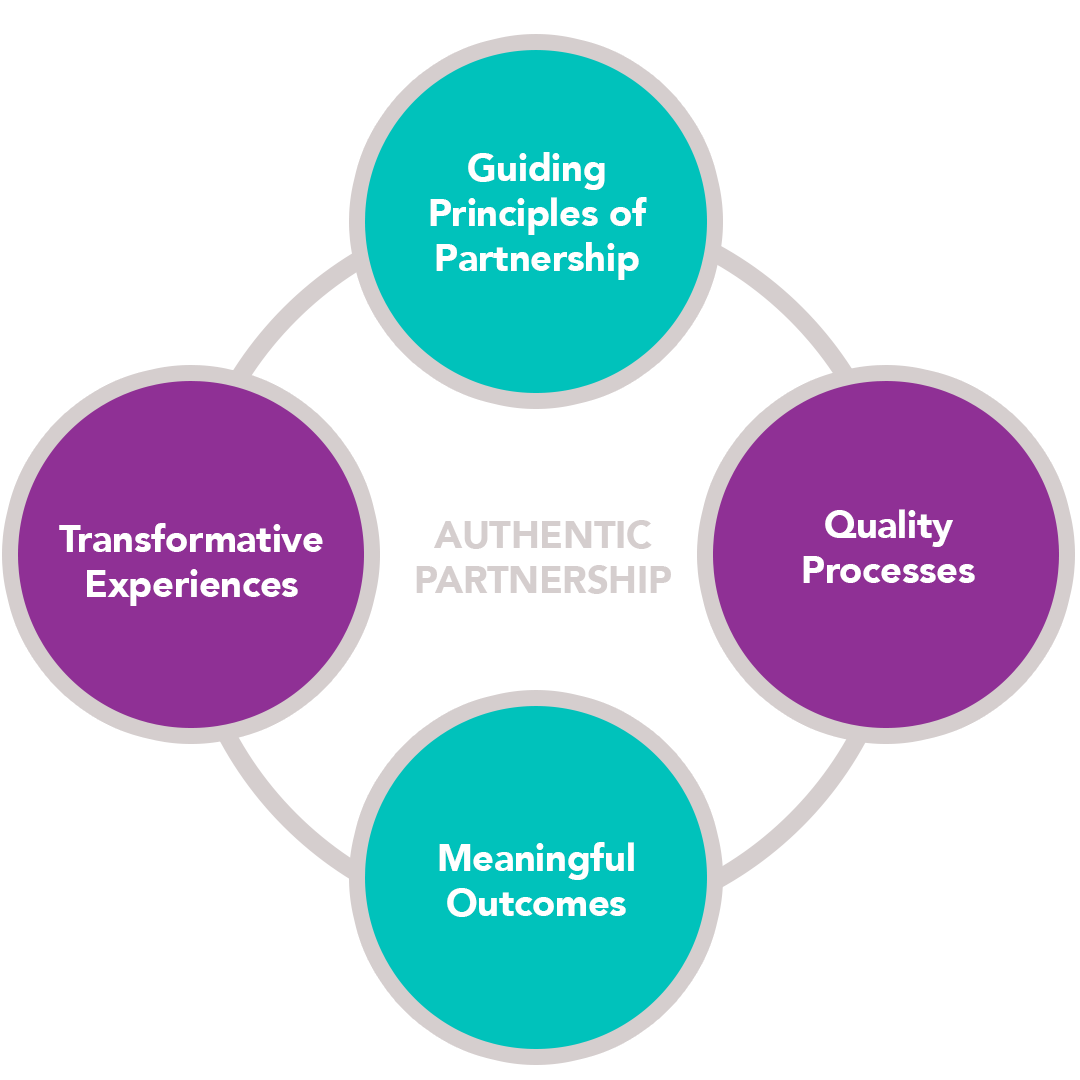Principles of Partnership
A fundamental belief of Community-Campus Partnerships for Health (CCPH) is that health equity and social justice need to be pursued both within partnerships and through them.
Elements of an Authentic Partnership
Over the last 15 years, CCPH has studied, examined, engaged in, and evaluated what makes partnerships work, sustain authenticity, and achieve the change they want to see in their community.
This figure aims to show how authentic partnerships best exist within a space that includes four specific elements:
1) Guiding Principles of Partnership
2) Meaningful Outcomes
3) Quality Processes
4) Transformative Experience(s)
These four elements represent a synthesis of the experiences of seasoned community and academic partners engaged in partnerships and on the extensive work of CCPH since its first set of principles were released on 1998. Each element is further described with the intent to guide the development of new partnerships and to support existing partnerships that do not feel they are fully self-expressed as authentic partnerships.

Guiding Principles of Partnership
The CCPH Guiding Principles of Partnership below are not meant to be prescriptive or adopted verbatim but rather to be used for discussion or as a model for developing one’s own principles of partnership.
- The Partnership forms to serve a specific purpose and may take on new goals over time.
- The Partnership agrees upon mission, values, goals, measurable outcomes and processes for accountability.
- The relationship between partners in the Partnership is characterized by mutual trust, respect, genuineness, and commitment.
- The Partnership builds upon identified strengths and assets, but also works to address needs and increase capacity of all partners.
- The Partnership balances power among partners and enables resources among partners to be shared.
- Partners make clear and open communication an ongoing priority in the Partnership by striving to understand each other’s needs and self-interests, and developing a common language.
- Principles and processes for the Partnership are established with the input and agreement of all partners, especially for decision-making and conflict resolution.
- There is feedback among all stakeholders in the Partnership, with the goal of continuously improving the Partnership and its outcomes.
- Partners share the benefits of the Partnership’s accomplishments.
- Partnerships can dissolve, and when they do, need to plan a process for closure.
- Partnerships consider the nature of the environment within which they exist as a principle of their design, evaluation, and sustainability.
- The Partnership values multiple kinds of knowledge and life experiences.
Meaningful Outcomes
Meaningful outcomes that are tangible and relevant to communities. For example: eliminating health disparities, creating affordable housing, closing the education gap and revitalizing rural economies.
Quality
Processes
Quality processes that are relationship focused; open, honest, respectful and ethical; trust building; acknowledging of history; committed to mutual learning and sharing credit.
Transformative Experiences
Occuring at multiple levels, including:
-
Personal transformation (e.g. self reflection and heightened political consciousness)
- Institutional transformation (e.g. changing policies and systems)
- Community transformation (e.g. community capacity building)
- Transformation of science and knowledge (e.g. how knowledge is generated, used and valued and what constitutes “evidence” and “ethical practice”)
-
Political transformation (e.g. social justice)
Proper Citation
If you use any content from this Position Statement, including the guiding principles, please use the citation below and let us know by email how you used the information and if it was helpful to you in any way.
Citation: CCPH Board of Directors. Position Statement on Authentic Partnerships. Community-Campus Partnerships for Health, 2013.




